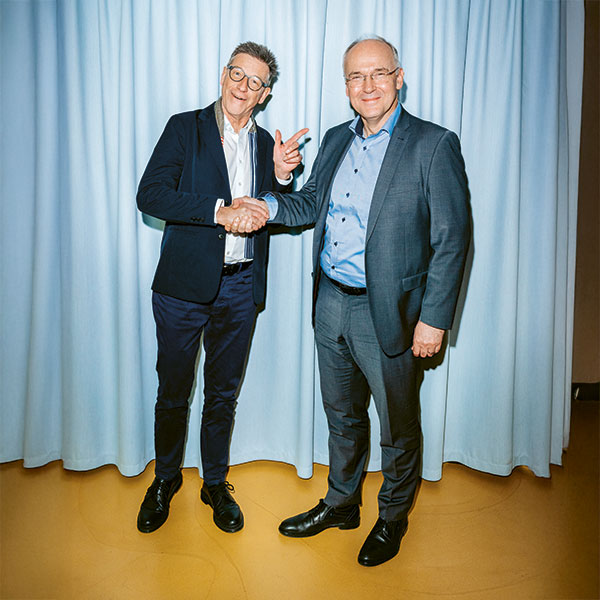Conflicts of interest: transparency isn’t enough
‘Doctors are the puppets of big pharma’. This oft-repeated accusation in fact hides other conflicts of interest that can restrict scientists’ judgement. It’s a problem that can’t be solved, only managed.

Transparency is the usual antidote to conflicts of interest. But controversial issues still arise, time and again. | Image: Valérie Chételat
Colonoscopy, biopsy, operation, radiotherapy, chemotherapy. Who decides when a procedure is necessary? And when should we refrain from undergoing a particular therapy? It’s usually professional associations of doctors that decide these questions. They define diseases and draft guidelines. It’s also them being confronted with concrete cases every day in their working lives, so it’s natural they should be the ones documenting the current state of knowledge.
But this is the very thing that John Ioannidis disagrees with. He’s a doctor, a biostatistician and a respected critic of his own profession. “Professional societies should abstain from authorship of guidelines and disease definition statements”. This was the title Ioannidis chose for an article he published in October 2018. As he describes it, over one hundred authors may contribute to a set of guidelines that are then cited by thousands of members of their professional associations, which are in turn sponsored by industry. Most of all, this serves to promote people’s career chances, and helps to cement “recognisable and sustainable hierarchies of clan power”. In other words: the experts have to choose between the welfare of their patients and their own. They have a conflict of interest.
Nevertheless, Ioannidis regards treatment guidelines as an important pillar of a medical profession founded on scientific fact. But they should not be written by relying on experts alone. He proposes incorporating external method researchers, patients’ representatives, general practitioners and healthcare professionals in the process. He believes that they are better suited to assess whether the side-effects of a therapy are justified for the person affected, and whether a therapy is economically viable under the circumstances in question.
The pharma industry: goodies or baddies?
David Klemperer is of the same opinion as Ioannidis. He’s a physician and professor of social medicine at Ostbayerische Technische Hochschule Regensburg. Because he would like to avoid conflicts of interest, he has joined an initiative called ‘Mein Essen bezahl ich selbst’ (MEZIS, literally ‘I pay for my own meal’). It aims to counter instances where the industry pays for favours – such as financing training courses or travel expenses.
Certain conflicts of interest are unavoidable – of that much, Klemperer is certain. But when it’s a matter of funding research, it’s really very simple: “I don’t have to accept any money”. Klemperer is critical of the influence exerted by the industry in assessing the efficacy of a therapy – especially when companies take part in studies themselves. He believes that in these cases, the studies tend to focus on the effects of a therapy that are easy to measure and that are not necessarily equivalent to a process of recovery. “For example, they will investigate whether a therapy stops a tumour from growing, whereas for the patient, his main concerns are a high quality of life and life expectancy”. And surveys have repeatedly shown that studies sponsored by industry assess the effectiveness of a therapy as being higher than in independent studies.
For the journalist-cum-cardiologist Lisa Rosenbaum, however, there’ll be no medical advances without collaborating with industry. In a series of articles in The New England Journal of Medicine, she has argued against demonising the industry, because this often culminates in personal attacks against researchers with connections to it, and people then stop looking at their actual arguments. “Tellers of such tales no longer need evidence of negative consequences in order to incite public outrage against industry and its collaborators; the associations themselves are enough to warrant condemnation, which has become an end in itself”. She also cites examples where critics of the industry were ultimately proven wrong, and the effectiveness of a therapy was confirmed in the long-term.
The boundaries of declaration
Today, institutions must navigate this maze of commercial interests. The solution is for everyone to reveal all areas of potential conflict. To this end, members of the Swissmedic Medicines Expert Committees have to declare their interests. You can also look at the external mandates of professors at the University of Zurich online.
But transparency alone isn’t a panacea, as the case of the Cochrane Community proves. This network of scientists, known for its independence, produces overview studies on the efficacy of therapies. Its authors are committed to one of the most comprehensive declarations of financial interests in the world of research – they even have to declare “other relationships or activities that readers could perceive to have influenced, or that give the appearance of potentially influencing, what [they write] in the submitted work”.
Despite these endeavours to achieve independence, a conflict broke out in the Cochrane Community in September 2018. The occasion was an overview study on the efficacy and side-effects of the vaccine against papillomavirus – a preventive measure against cervical cancer. The study was criticised for “not taking into account almost half the relevant studies”, and thus also ignoring important data on side-effects. According to an investigation carried out subsequently by the network, in fact only a few studies had not been considered. To have taken these into consideration “would have had little to no impact on the basic conclusions”.
Purists vs pragmatists
The main critic involved was Peter Gøtzsche, a Danish medical researcher who is controversial figure on account of his repeated, extreme claims about the pharmaceutical industry. Shortly after he criticised the overview study in question, he was expelled from Cochrane’s governing board. The main reason was that he had “repeatedly represented his personal views as those of Cochrane”. Observers on the other hand spoke of a dispute between purists and pragmatists in dealing with conflicts of interest. Gøtzsche claimed that three of the four authors of the overview study had had financial conflicts of interest some ten years earlier. The fact that Gøtzsche’s own activism also involves a conflict of interest was barely discussed during this controversy. “If you reduce conflicts of interest to financial matters, then you overlook other factors that are at least as important”, says Nikola Biller-Andorno, who is a doctor and bioethicist at the University of Zurich. Publications, prizes and promotions are just as effective as incentives and can influence scientific judgement, especially when chasing a success story.
So what can be done to counter all these co-determining factors? “We all have our conflicts of interest”, says Bernard Burnand, who is a doctor and head of Cochrane Switzerland. In the academic system, you’re under a lot of pressure to publish as much as possible and also to create start-ups. This only exacerbates the problem. His conclusion is that “the least bad solution remains to declare your conflicts of interest as comprehensively as possible”. Up to now, such declarations have been relatively modest in science journals. “It would be good if this was done more systematically”. It could be achieved, for example, using online platforms such as orcid.org. But it remains to be seen what the guidelines would be.
Florian Fisch is a science editor at the SNSF.




